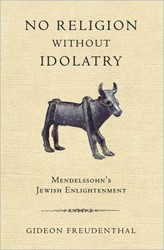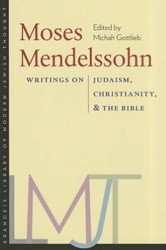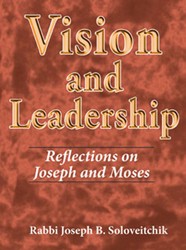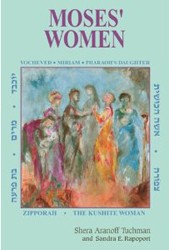By
– September 1, 2011
Moses Mendelssohn lived in two worlds — the modern intellectual world of the Enlightenment and the observant world of traditional Judaism — and strove throughout his life to unite them. In this brief biography Shmuel Feiner, a scholar of the Jewish Enlightenment and professor of Modern Jewish History at Bar Ilan University , paints a sympathetic picture of this modest man who achieved wide recognition for his groundbreaking thought but whose life was marked by the strains imposed on him as a Jew.
Born poor in the town of Dessau, Mendelssohn was a promising student who at fourteen followed his teacher to Berlin. Headed for the yeshiva, the only advanced education available to Jews, Mendelssohn encountered new influences, including Maimonides’ recently republished Guide to the Perplexed, out of print since the 12th century. Galvanized by Maimonides’ belief in reason and intellect as the path to truth and knowledge of God, Mendelssohn soon began studying philosophy and science, modern languages, and even Latin so that he could read John Locke. With no formal education or university connections, Mendelssohn won first prize in a Royal Academy of Science competition and was later elected a fellow. His work brought him into the circle of leading thinkers of the day, from Immanuel Kant to Gotthold Ephraim Lessing, a lifelong friend and the playwright who modeled his Nathan the Wise on Mendelssohn.
Although dubbed the German Socrates, welcomed into aristocratic homes, and honored both in Berlin and beyond, Mendelssohn never escaped personal affronts or transcended the limitations forced on him by his religion. Friedrich II, the king of Prussia, vetoed Mendelssohn’s election to the Royal Academy, a bitter blow, and did not follow Joseph II of Austria in loosening some restrictions on Jews. An observant and committed Jew, Mendelssohn fought off humiliating public appeals to convert and recognize the superiority of Christianity.
In extensive quotations from Mendelssohn’s many works, Feiner provides an introduction to Mendelssohn’s open, humanist thought and hopes, as well as his abiding fear that Jews would never attain full civil standing without sacrificing their religious tradition. Mendelssohn’s letters often reveal his disappointments and the burden he carried as spokesman for the Jewish community to both the governmental authorities and intellectual elite, defending Judaism even as he attempted to purge it of rabbinic authority and insularity. Feiner is particularly sensitive to Mendelssohn’s desire for a life of study, enriched by family and his salon of likeminded friends and thinkers, even as he was thrust time and again into the public arena. A volume in Yale’s series Jewish Lives, Moses Mendelssohn meets the series’ goal of exploring “the breadth and complexity of Jewish experience.” Chronology, index, select bibliography.
Born poor in the town of Dessau, Mendelssohn was a promising student who at fourteen followed his teacher to Berlin. Headed for the yeshiva, the only advanced education available to Jews, Mendelssohn encountered new influences, including Maimonides’ recently republished Guide to the Perplexed, out of print since the 12th century. Galvanized by Maimonides’ belief in reason and intellect as the path to truth and knowledge of God, Mendelssohn soon began studying philosophy and science, modern languages, and even Latin so that he could read John Locke. With no formal education or university connections, Mendelssohn won first prize in a Royal Academy of Science competition and was later elected a fellow. His work brought him into the circle of leading thinkers of the day, from Immanuel Kant to Gotthold Ephraim Lessing, a lifelong friend and the playwright who modeled his Nathan the Wise on Mendelssohn.
Although dubbed the German Socrates, welcomed into aristocratic homes, and honored both in Berlin and beyond, Mendelssohn never escaped personal affronts or transcended the limitations forced on him by his religion. Friedrich II, the king of Prussia, vetoed Mendelssohn’s election to the Royal Academy, a bitter blow, and did not follow Joseph II of Austria in loosening some restrictions on Jews. An observant and committed Jew, Mendelssohn fought off humiliating public appeals to convert and recognize the superiority of Christianity.
In extensive quotations from Mendelssohn’s many works, Feiner provides an introduction to Mendelssohn’s open, humanist thought and hopes, as well as his abiding fear that Jews would never attain full civil standing without sacrificing their religious tradition. Mendelssohn’s letters often reveal his disappointments and the burden he carried as spokesman for the Jewish community to both the governmental authorities and intellectual elite, defending Judaism even as he attempted to purge it of rabbinic authority and insularity. Feiner is particularly sensitive to Mendelssohn’s desire for a life of study, enriched by family and his salon of likeminded friends and thinkers, even as he was thrust time and again into the public arena. A volume in Yale’s series Jewish Lives, Moses Mendelssohn meets the series’ goal of exploring “the breadth and complexity of Jewish experience.” Chronology, index, select bibliography.
Maron L. Waxman, retired editorial director, special projects, at the American Museum of Natural History, was also an editorial director at HarperCollins and Book-of-the-Month Club.





